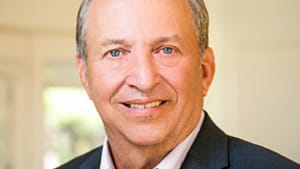Stay in the Loop
BSR publishes on a weekly schedule, with an email newsletter every Wednesday and Thursday morning. There’s no paywall, and subscribing is always free.
Lessons from the world’s smartest men
Donald Trump and two other geniuses

First, Donald Trump claimed to be a billionaire but refused to release his tax returns. Then, this month, he described himself on Twitter as “like, really smart” but declined to release his IQ score.
Do you see a pattern here?
Actually, Trump’s description of himself as “a very stable genius” got me thinking about two other self-proclaimed geniuses of recent times.
Lawrence Summers is, according to his own personal website, “one of America’s leading economists,” a man who “has been recognized as one of the world’s most influential thinkers by Time, Foreign Policy, Prospect and the Economist magazines among many others.” Summers served as Treasury secretary under Bill Clinton and as director of the National Economic Council for Barack Obama. Henry Kissinger once remarked that Summers should have a permanent job at the White House, solely to sort out for the president — any president — the good ideas on economic policy from the dumb ones. He “has the rare ability to see the world that is taking shape and the skill to help to bring it into being,” Bill Clinton once explained.
Shaking up Harvard
Yet when Summers became president of Harvard in 2001, he perceived the myriad flaws in the university’s culture with such clarity that he alienated damn near everyone on campus who failed to genuflect before his intellect. In a private conversation with Cornel West, a well-known Harvard professor of African and African-American studies, Summers inveighed against grade inflation and demanded more rigor in teaching; West, feeling personally insulted, decamped soon after for Princeton. In a keynote speech at a conference on diversity, Summers hypothesized that the shortage of women in certain disciplines could be explained by innate differences in mathematical ability between the genders.
In these and other similar gaffes at Harvard, Summers claimed he was quoted out of context and/or was just trying to shake the campus out of its smug complacency. For all his alleged brainpower, Summers failed to understand that his job was to get people to work together toward a common goal, not dazzle everyone with his brilliance. In 2006, with a no-confidence vote in Harvard’s faculty senate, Summers resigned; his five-year tenure as Harvard’s president was the shortest since 1862, when Cornelius Felton died after two years in office.
Too smart by half

Or consider Philadelphia’s erstwhile state senator and power broker, Vincent Fumo. For three decades, as he leveraged his influence by accumulating a network of public, private, and quasi-public roles, Fumo’s name was synonymous with self-aggrandizement (“the act or practice of exaggerating one’s own importance, power, or reputation,” according to the American Heritage Dictionary). Fumo impressed the impressionable with casual references to his membership in MENSA, the international society for those with a need to proclaim their high IQs. His gullible enablers included the editors of Philadelphia magazine, who included Fumo on their list of “Smartest Philadelphians” in 2001 and in 2008 said that, after David Cohen, he was the “smartest man in Philadelphia politics.” But the most striking thing about Fumo’s record was the mediocrity of his achievements and the extent to which his power was devoted merely to reinforcing that power.
As it turns out, Fumo was too smart by half. In 2009 a federal jury found him guilty of defrauding Pennsylvania’s state senate and two nonprofit organizations, as well as staging a cover-up in a failed attempt to thwart the FBI and federal prosecutors. He spent four years in prison and five months in home confinement.
Four passengers on a plane
What are the lessons here — for Trump or any other self-proclaimed genius? I suggest two:
- There’s a difference between brilliance and wisdom.
- Genuinely smart people know better than to tell people how smart they are.
Surely you know the old joke about four passengers — the Pope, a hippie, the president of the United States, and the world’s smartest man — on a plane that carries only three parachutes. The captain emerges from the cockpit to inform them that the gas tank is leaking and the plane will crash in 15 minutes. “You’re adults,” the captain says, tossing the three parachutes into the aisle, “so decide among yourselves who is most deserving.”
The president, declaring himself indispensable to the world, seizes one parachute and jumps out the window. The world’s smartest man does likewise. The Pope urges the hippie to take the last parachute, but the hippie insists that two parachutes still remain.
“How can that be?” asks the Pope.
“Well, you see, Your Holiness,” the hippie replies, “the world’s smartest man just jumped out of the plane with my backpack.”
The moral of this joke used to be obvious: beware of people who pronounce themselves, like, really smart. But back when this joke first surfaced, who could have conceived that the world’s smartest man would also be president of the United States?
Sign up for our newsletter
All of the week's new articles, all in one place. Sign up for the free weekly BSR newsletters, and don't miss a conversation.

 Dan Rottenberg
Dan Rottenberg